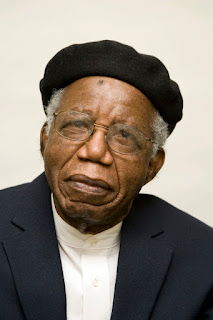Chinua Achebe's Faith and Myth
Chinua Achebe, a well known person among the African novelists who had challenged European perspective in the direction of Africans. He was the father of African literature. He portrayed by giving a true account of people of Africa their belief ,habit ,customs and superstitions moreover what they thought of white people. By discussing upon the nagro tribes which are disintegrating and falling apart by the impact of British colonization. Reaching of Christian missionary whose purpose was to spread the message of Christianity and convince the people over there to change their religion.
His attention actually based on African facts and myth in the both novels “ Things fall Apart ” and “ Arrow of God” turned up the metamorphosis of Africa from traditional to new manner. In his investigation, he placed the transfigure as a aftermath of culture of ancient tribal’s bestow a concept of the primitive African background. There is an advancement of African, past history was found in his works Rectilinear history concerned to the west Africa, the myth is the dream of a person and it is everlasting. The Igbo tribes in Africa have their own superstitions, belief and revealed their great respect upon culture. This reality of West Africa provided the most vigorous utterance of the colonial clash with a distinctive graceful articulation of form and feeling requiring attentiveness from the novelist Chinua Achebe.
The various aspects of both pre-colonial history and colonial era of Africa had come out by analyzing of African history. The African history began with the emergency of homo sapiens in East Africa was full of chaos agitation disorder and despair. Even in before recorded history, Africans had to bear the brunt of state in one or the other form to hasn’t them. The period of colonial started with the encroachment of various European countries like Portugal, frame of England. They did not only spoil its natural resources but also destroyed its ration-politico economic structures which further drew the African continent into the deep area of gloomy and loss of hope and surrendered to despair. The other devaluating aspects of colonialism was the annihilation of native culture and deception of white standards. African value and culture were different from the European ones, but these defferences were treated as evil, crudity and prehistoric.Colonization in Africa had its consequence which led to the rise of Africa had its consequence which led to the rise of African nationalism. The indigenous rightly demanded complete independence form the European repressive forces which further watered the feeling of Freedom struggle. Consequently, In 1960, the African continent started to get its independence from Europe and specially Nigeria, which was the mother land of chinua Achebe, declared independent in 1960. The result of colonialism gave birth to more violent and withholding socio-political forces that disturbed Africa. Corruption, hatredness, achievement and deflation became order of the day. Anarchy became part and parcel of the free Africa. In order to deal with this chaos in every aspect of African life, the African novel in general and Nigerian in particular African novel came out as a form of articulation which judgments the menace of the postcolonial examples.
The task of building national identity could only be taken up by the African haves as it has deep roots in the literary and areas tradition of African culture which no other genre could have served better different writers in their peculiar ways dealt with the issues and pertaining of the post colonial Nigeria, but Chinua Achebe was different and imaginative in its treatment by combining local sensibility in the colonizer’s language and making it more civic for the local readers. The development of a strict and independent literature in English from the Africa continent was an essential historical and notable sight in African history. For it Achebe was venerated as one of the founders of present Nigerian literature for his historical impressionable and perceptive novels about his land and its people. He was praised for his capability to skillfully combine traditional mythology with western ideologies or beliefs, and critics quick to not that archive’s works were the first and foremost a contemporary African writer that conveyed message of Africa.
In this works ,he declared the truth of something the educational function of literature and set up a human framework for accepting modern Nigerian history. The first confrontation between European and African cultures at the turn of the country in “Things fall Apart(1955) was promoted in expectation of the uncomfortable years at once earlier independence in “No Longer at Ease “(1960)” . The incitement and saddening situation of Nigeria’s first Republic in “A Man of The People in (1966)”, and exploration and conviction of political corruption in post-colonial African in “Anthills in The Savannah(1980)” lead him to oppose interpersonal, political, cultural and linguistic forms of dictatorship. He collaborated determined unwillingness to recognize the validity of various way of thinking which was the central flaw of the main hero with the cultural exaggerated self opinion of colonial powers and non-believing greed of Nigerian officials, Achebe argued against this shortsighted authoritarianism through the use of multiple views and irony.The Nigerian novelist looked default socio-political turn African history at the hands of Achebe. Showing his position and contribution in the African literary tradition, the study will take up many novels entitled “Things Fall Apart”, “No Longer at Ease”, "A man of the people” and “Anthills in the Savannah” for detailed analysis. Achebe’s protagonists conflicting self-realization and social responsibility displays the problems of reaching a balance. Every character’s locomotion towards collective approvals was hindered by the devastating pull of individual pride. In “Things falls Apart”, Okonkwo conquered personal embarrassment to achieve the respect of his Igbo community, but his stubborn unwillingness to put up himself to the increasing impression of colonial government and Christianity alienates him from his clansmen and rambles him to self destructive violence. In “No Longer at Ease”, The character, Obi self-righteously withstand the corruption of government service, hostility himself from his follow civil servants and the clansmen who provided his education, but when his honour needed to maintain an expensive lifestyle lead him to accept a bribe, his unprofessional attempt after that in his arrest. In “A Man of the people” the cynical Odili, work together in Naga’s political under guidance of rural people, learns to see the corrective value of indigenous beliefs. Achebe’s “Anthills of Savannah ” was an observation of the next tragic act, this political drama shown a power struggle in the westernized, postcolonial African state of kangan.
Achebe’s novel had been searched by researchers from different points of views, and examined tendencies to the historicity one of his shortcomings of these was that hardly any researcher had attempted to discuss about colonial and postcolonial elements of his novel at the same time. The present topic will assimilate explanatory analysis of linguistic person’s background, and cultural novelty which have become defining tenants of his fiction. It would further elaborate both the colonial and post colonial developments that have shaped the African novel as a type o opposition.




Yes,I like it so much
ReplyDeletefantastic
ReplyDelete